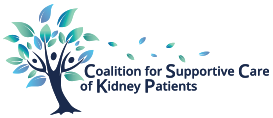It looks like the link pointing here was faulty. Maybe try searching?
Interested in improving kidney supportive care?
Join us for productive conversations that explore values
that matter most to people with chronic kidney disease.

Menu
Coalition for Supportive Care of Kidney Patients
The George Washington University School of Nursing
Email: kidneycoalition@gwu.edu
Copyright © 2023 | All Rights Reserved
